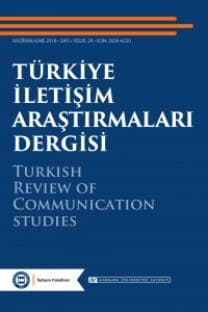Popüler Tarihyazımı Mecrası olarak Türk TV Dizilerindeki Öykülendirme Pratiklerinin Değerlendirilmesi
Bu makale, Türk izleyicisi üzerinde sembolik bir güce sahip olduğu kabul edilen üç farklı televizyon dizisinde temsil edildiği şekliyle, öykülendirme ve ahlakilik arasında bir köprü kurmaya çalışmaktadır. Bu çalışma için seçilen diziler, Türkiye’de farklı televizyon kanallarında yayınlanan Diriliş, Ertuğrul, Vatanım Sensin, ve Yunus Emre’dir. Bu makalede, tarihsel olayların ve kişiliklerin öykülendirilmesi için kullanılan retorik stratejilerin aynı zamanda gelenek ve kültür üzerine olan savaşımlarla ilişkisi üzerine analitik bir araç olduğu göz önünde tutulmaktadır. Buradaki temel ön kabul, söz konusu programlarda yer alan retorik stratejileri anlama girişiminin günümüzde ortaya çıkan son derece kaygan bir zeminde yer alan ideolojik gerilimleri ve taktikleri analiz etme biçimlerimiz üzerine etkisi olduğuna dair argümandır. Bu makalede, ahlaki bir iddia inşa etmede kullanılan üç strateji, kutsallık, topluluk ve özerklik üçlüsüne dayanan bir model yardımıyla ele alınacaktır (Sheweder, Much, Mahapra, ve Park, 1997). Bu makalede, popüler televizyon dizilerinde yer alan anlatı düzeneğinin rolü, faillik (agency) kavramının önemi ve yorumun siyaseti ile ilişkisi çerçevesinde irdelenmektedir.
Anahtar Kelimeler:
Anlatı, Hikaye Anlatımı, Televizyon Dizileri, Ahlak, Retorik Stratejiler
Evaluating Narrativization Practices in Turkish TV serials as a Venue of Popular Historiography
This paper aims at constructing a bridge between narratives and morality, as represented in three selected TV dramas assumed to have symbolic power over Turkish audiences: Resurrection, You are My Homeland, and Yunus Emre. The storification of historical events and personalities through TV dramas is considered to increase understanding of how different moral argumentations are related with contestations over tradition and culture. The major assumption in this article is that understanding the basic rhetorical strategies in these programs has a major impact on the way in which we analyze current ideological tensions and tactics, which are positioned on a constantly shifting ground. In this paper, the voices used in the strategies of constructing a moral argumentation will be evaluated through a model based on discourses of divinity, community, and autonomy (Sheweder, Much, Mahapra, & Park, 1997). The role of narrative transactions in TV dramas is explicated so as to make an assessment on the significance of agency as well as the politics of interpretation.
Keywords:
Narrative, Storytelling, TV Serials, Morality, Rhetorical Strategies,
___
- Anderson, S. (2000). Loafing in the garden of knowledge: History TV and popular memory. Film & History: An Interdisciplinary Journal of Film and Television Studies, 30(1), 14-23.
- Barthes, R. (1977). Elements of semiology. Macmillan.
- Bakhtin, M. (1993). Toward a philosophy of the act (V. Liapunov, Trans.; M. Holquist & V. Liapunov, Eds.).
- Black, E. (1988). Secrecy and disclosure as rhetorical forms. Quarterly Journal of Speech, 74(2), 133-150.
- Burke, K. (1969). A rhetoric of motives (Vol. 178). Univ of California Press.
- Frank, A. W. (2002). Why study people's stories? The dialogical ethics of narrative analysis. International journal of qualitative methods, 1(1), 109-117.
- Hakemulder, J. (2000). The moral laboratory: Experiments examining the effects of reading literature on social perception and moral self-concept (Vol. 34). John Benjamins Publishing.
- Hodgkin, K., & Radstone, S. (Eds.). (2003). Contested pasts: The politics of memory. Routledge.
- Johnson, M. (1994). Moral imagination: Implications of cognitive science for ethics. University of Chicago Press.Johnson
- Nussbaum, M. C. (2003). Upheavals of thought: The intelligence of emotions. Cambridge University Press.
- Rorty, R., & Rorty, R. M. (1989). Contingency, irony, and solidarity. Cambridge University Press.
- Shweder, R., Much, N., Mahapatra, M., & Park, L. (1997). Divinity and the “big three” explanations of suffering. Morality and health, 119, 119-169.
- White, H. (1982). The politics of historical interpretation: discipline and de-sublimation. Critical Inquiry, 9(1), 113-137.
- Widdershoven, G. A. (1993). The story of life: Hermeneutic perspectives on the relationship between narrative and life history. The narrative study of lives, 1, 1-20.
- Başlangıç: 1992
- Yayıncı: Marmara Üniversitesi
Sayıdaki Diğer Makaleler
Bir Kamu Politikası Aracı Olarak Davranışsal İçgörü
Kapitalist Sistemin Muhafızları Olarak Hollywood Süper Kahramanları: Süpermen Örneği
(MMO)RPG Video Oyun Karakterlerinin Cinsiyet ve Etnik Stereotipleri
Türk Sinemasında Gazeteci Kimliğinin Temsili
Sanal Gerçeklik, Hakikat Kavramının Dönüşümü ve Popüler Kültürdeki Yansımaları
Burcu KAYA ERDEM, Elif KARAKOÇ
İlkokul Öğrencilerinin Çizgi Film İzleme Pratikleri ve Çizgi Film Karakterlerine İlişkin Algıları
Şiddetin ve Suçun Kamusallaşması: Reality Showlar ve Toplumsal Etkileri
